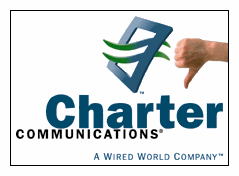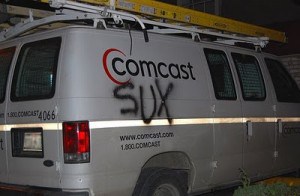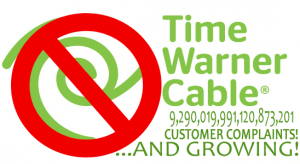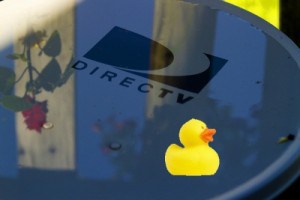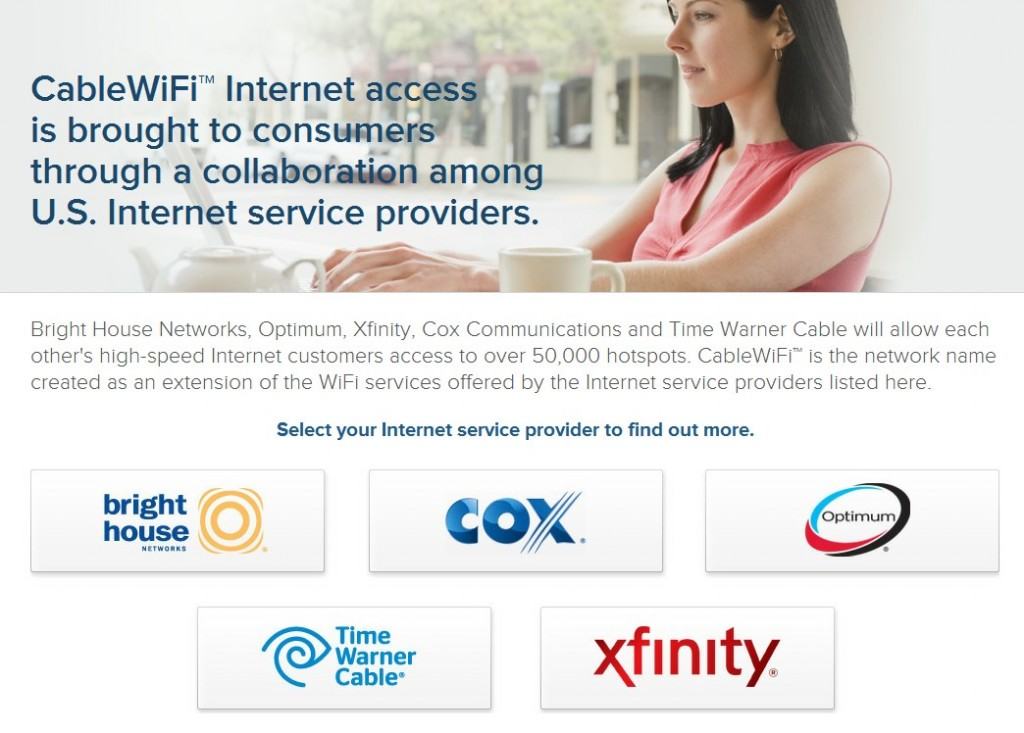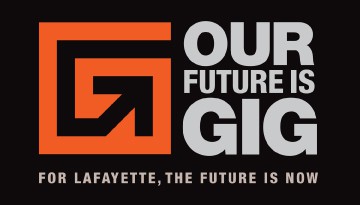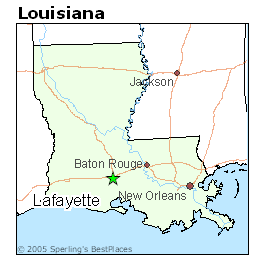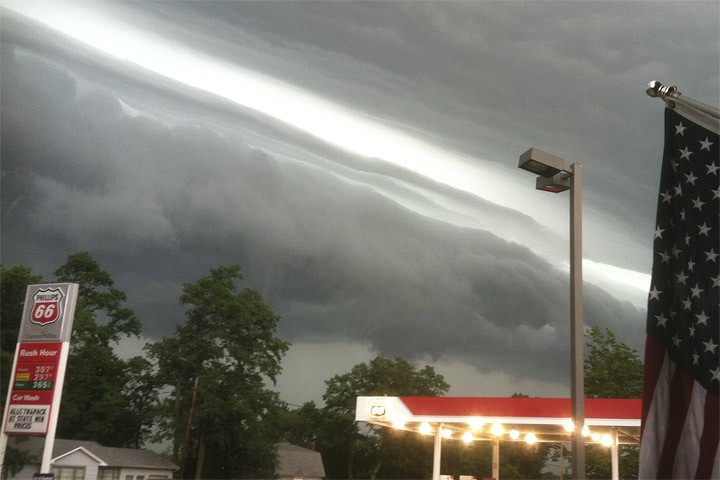
NOAA caught this ominous derecho cloud front in La Porte, Ind on June 29. The same storm would later cut power for millions all the way to the eastern seaboard.
A series of severe thunderstorms accompanied by near-hurricane-force winds caused millions of customers in several Mid-Atlantic states to lose power and telecommunications services late Friday, and some are expected to remain without service until at least this coming weekend.
The storm, known as a “derecho,” uprooted trees, which in turn knocked down power lines and caused wind-related damage to buildings from Ohio to West Virginia, Virginia to Maryland, and even into North Carolina.
But the storm also is raising questions about the massive failures in commercial telecommunications systems that left entire 911 emergency response systems offline for days, wireless networks non-operational, cell phone systems overwhelmed, and broadband service, deemed a lower priority by emergency officials, down and offline.
Some of the biggest problems remain in and around the nation’s capital and in the states of West Virginia and Virginia, where inadequate infrastructure proved especially susceptible to the storm’s damaging winds.
D.C., Maryland, and northern Virginia
In northern Virginia, calls to 911 were met by silence over the weekend, thanks to a catastrophic failure of Verizon’s landline network. With primary lines down, Verizon’s backup 911 systems also failed, leaving millions with no access to emergency responders.
Fairfax County officials finally put the word out the best way to summon emergency help was to drive (through streets littered with debris and downed power lines) to the nearest fire or police station for assistance.
“It’s just not OK for the entire 911 system in the region to go down for the period of time that we were out, especially after an enormous emergency where people needed to make those calls the most,” Sharon Bulova, chairman of the Fairfax County Board of Supervisors, told the Associated Press.
 Verizon spokesman Harry Mitchell was left flat-footed, promising an investigation into Verizon’s latest 911 failure, and called the storm as damaging as a hurricane. He urged local officials to “move forward” beyond the immediate criticism and help make progress to get service restored.
Verizon spokesman Harry Mitchell was left flat-footed, promising an investigation into Verizon’s latest 911 failure, and called the storm as damaging as a hurricane. He urged local officials to “move forward” beyond the immediate criticism and help make progress to get service restored.
Many emergency response networks also depend on telecommunications services, including fiber cables, to reach transmission towers for radio dispatch and mobile data terminals. In northern Virginia, the city of Alexandria has been managing to handle emergency dispatch services for several counties.
With power lines down, cable and phone lines often went as well. In those cases, electric utilities have first priority to restore service, and then cable and phone companies can begin repairs of their own.
Since cable operators rely on power companies to supply electricity to their amplifiers and other equipment, Comcast and Cox, which dominate the region, are blaming most of their outages on power disruptions, and promise service will be restored when the power returns.
Verizon’s DSL and FiOS broadband networks were both disrupted by the storm, primarily because of downed lines and power losses.Even wireless networks, which some might suspect would be immune to downed lines, were also seriously affected by the storm. Cell towers connect to the provider’s network through fiber optic and T1 lines, and although backup power generators can maintain a cell tower for days in some cases, backhaul line cuts can leave cell towers useless.
In metro D.C., call completion problems were a problem during the storm and sometime after as local residents turned to cell phones to communicate. Over the weekend, customers in and around Richmond, Va., found Verizon Wireless useless for text messages because of a service disruption. As backup generators ran dry of fuel, some cell towers that survived the initial storm have been shutting down until maintenance crews arrive and refuel.
The harshest criticism has so far escaped phone and cable companies. Instead, local officials and residents remain focused on Pepco, the power utility serving the Washington area. Pepco has learned from previous storms to become a master of lowered expectations, and is promising to do its best to restore power a week or more after the storm was a memory.
West Virginia and western Virginia
 The state of West Virginia, and western rural Virginia state, have illustrated what happens when deteriorating infrastructure is asked to withstand winds of up to 100mph. Frontier’s operations in West Virginia were hit especially hard. Landline networks in that state had been allowed to deteriorate for years by former owner Verizon Communications. Frontier had its hands full trying to keep up with repairs, calling in additional staff and trying to maintain landline service in some areas with the help of generators.
The state of West Virginia, and western rural Virginia state, have illustrated what happens when deteriorating infrastructure is asked to withstand winds of up to 100mph. Frontier’s operations in West Virginia were hit especially hard. Landline networks in that state had been allowed to deteriorate for years by former owner Verizon Communications. Frontier had its hands full trying to keep up with repairs, calling in additional staff and trying to maintain landline service in some areas with the help of generators.
That job was made much harder by a rash of generator thefts that impacted the phone company, and local authorities are still looking for those responsible. At least one-third of all central switching offices operated by Frontier in West Virginia remain on generator power as of yesterday. As of July 3, the company reported it has 12,000 repair requests still waiting for action.
It was a similar story in the western half of Virginia where independent phone companies and Verizon were faced with an enormous number of downed trees and power lines, many in rural areas. More than 108,000 Virginia residents are still without power as of this afternoon, and many will not see it restored until the weekend.
Because the derecho swept across a large area encompassing the entire state, it has been difficult for utility crews to respond from unaffected areas to assist in repairs because the damage was so widespread. Logistically, just coordinating repair operations has proved difficult because cell service has been spotty (or networks have been jammed with calls) in some of the worst-affected areas.
“Derechos are nothing to fool with, but still this was not the most serious storm Virginia has ever dealt with, and the impacts on our telecommunications networks seem to indicate they’ve been allowed to fall apart over the last several years,” shares Stop the Cap! reader Edward Klein, who lives near Roanoke. “I think an investigation is needed to make sure utilities are spending enough money to keep these networks in good shape so this kind of thing doesn’t happen everytime a storm sweeps through.”


 Subscribe
Subscribe